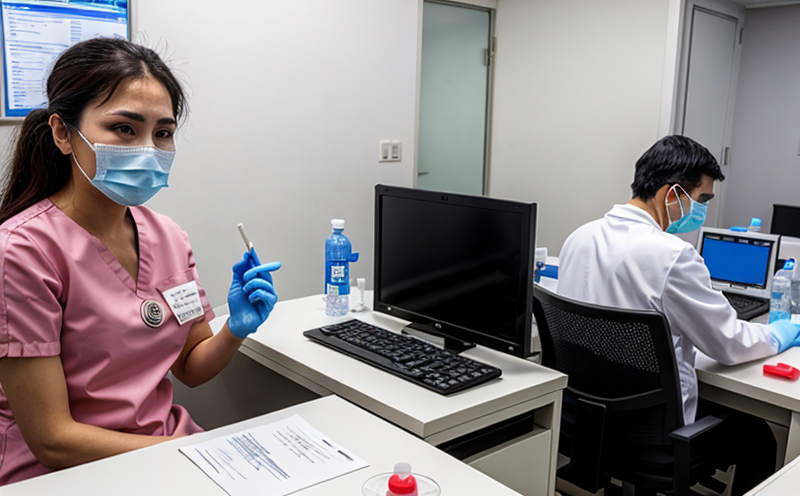Feline Calicivirus Serology Testing in Cats
The feline calicivirus (FCV) is a significant pathogen responsible for causing upper respiratory tract diseases, oral lesions, and sometimes severe systemic infections in cats. FCV serology testing is crucial in understanding the immune status of individual felines and in managing outbreaks within shelters or clinics.
This test measures the presence and titers of antibodies against FCV in a cat’s serum. The primary purpose is to assess whether the animal has been exposed to FCV, indicating past infections or vaccinations, or to evaluate the immune response following a vaccination program. It plays a pivotal role in diagnosing current infections and monitoring recovery.
The serology test involves collecting blood samples from affected cats using our high-quality venipuncture kits. The collected serum is then analyzed using an enzyme-linked immunosorbent assay (ELISA) which provides quantitative results indicating the level of antibodies present. This information is invaluable for veterinarians in formulating treatment plans, understanding immunity status, and preventing potential outbreaks.
For quality assurance, we adhere strictly to international standards such as ISO 15189 and EU directives ensuring that our results are reliable and comparable across different laboratories. Our advanced instrumentation, coupled with strict adherence to these guidelines, guarantees precise and accurate test outcomes.
- Specimen Collection: Blood samples should be collected in a vacuum tube containing anticoagulant for serology testing.
- Serum Separation: The sample must undergo proper centrifugation to ensure accurate serum separation. Incorrect procedure can lead to inaccurate results.
- Test Kit Compatibility: Our ELISA kits are optimized for the detection of FCV antibodies, ensuring high sensitivity and specificity.
The turnaround time is typically 48 hours from receipt of the sample. Results can be accessed through our secure online portal or via a dedicated phone line. Interpretation of results involves comparing the antibody titers to reference values established by leading veterinary virologists, providing insights into the cat’s immune response.
In cases where FCV is suspected based on clinical signs, serology testing can confirm exposure and inform treatment strategies. For instance, if a cat has a low titer of antibodies, it may require additional supportive care or further vaccinations to boost its immunity. Conversely, high titers indicate robust protection against the virus.
FCV serology testing is also essential in managing feline populations in shelters and multi-cat households where transmission can be rapid and widespread. Understanding the immune status of each cat allows for targeted interventions such as quarantine, vaccination campaigns, or environmental disinfection protocols to prevent further spread.
Eurolab Advantages
At Eurolab, we offer unparalleled expertise in feline virology testing. Our dedicated team of veterinarians and molecular biologists ensures that each test is conducted with the highest level of precision and care.
- Expertise: Our team has extensive experience in diagnosing and managing viral infections in cats, providing reliable results tailored to individual needs.
- State-of-the-Art Equipment: Utilizing cutting-edge technology from leading manufacturers ensures that our tests are both accurate and reproducible.
- Comprehensive Reporting: We provide detailed reports with actionable insights, helping veterinarians make informed decisions about patient care.
We pride ourselves on delivering rapid turnaround times and secure handling of sensitive data. Our commitment to quality is further reinforced by our continuous efforts in training staff and updating protocols based on the latest scientific advancements.
Why Choose This Test
Feline calicivirus serology testing offers several compelling advantages over other diagnostic methods. It provides a non-invasive way to assess an individual cat’s immune status without exposing it to additional stress through invasive procedures like biopsies or cultures.
Moreover, serology tests can detect antibodies even in asymptomatic cats, which is particularly useful for identifying carriers within a population. This capability enhances the effectiveness of preventive measures and outbreak control efforts.
The test’s non-invasive nature also makes it suitable for routine monitoring programs aimed at maintaining optimal health standards in institutions housing multiple felines such as shelters or research facilities.
Additionally, serology testing contributes to more targeted vaccination strategies by identifying those individuals who may not have adequate protection. This targeted approach can lead to more effective use of resources and a reduction in unnecessary exposure risks for unvaccinated cats.
Quality and Reliability Assurance
- Accurate Instrumentation: Our tests are conducted using equipment that meets the highest international standards, ensuring precise results.
- Standard Operating Procedures (SOPs): Every step in our testing process adheres to strict SOPs designed to minimize errors and maximize consistency.
- Trained Personnel: Our staff undergo continuous training to stay abreast of the latest developments in veterinary diagnostics.
- Regular Calibration: All instruments are regularly calibrated using reference materials to ensure accuracy over time.
We maintain a quality management system that complies with ISO 15189 and EU directives, ensuring our services meet the highest standards of reliability and precision. This commitment translates into trustworthiness for both clients and their patients.
Our robust quality assurance measures also extend to the integrity of our data handling processes, guaranteeing that all information remains confidential and secure throughout its lifecycle.





